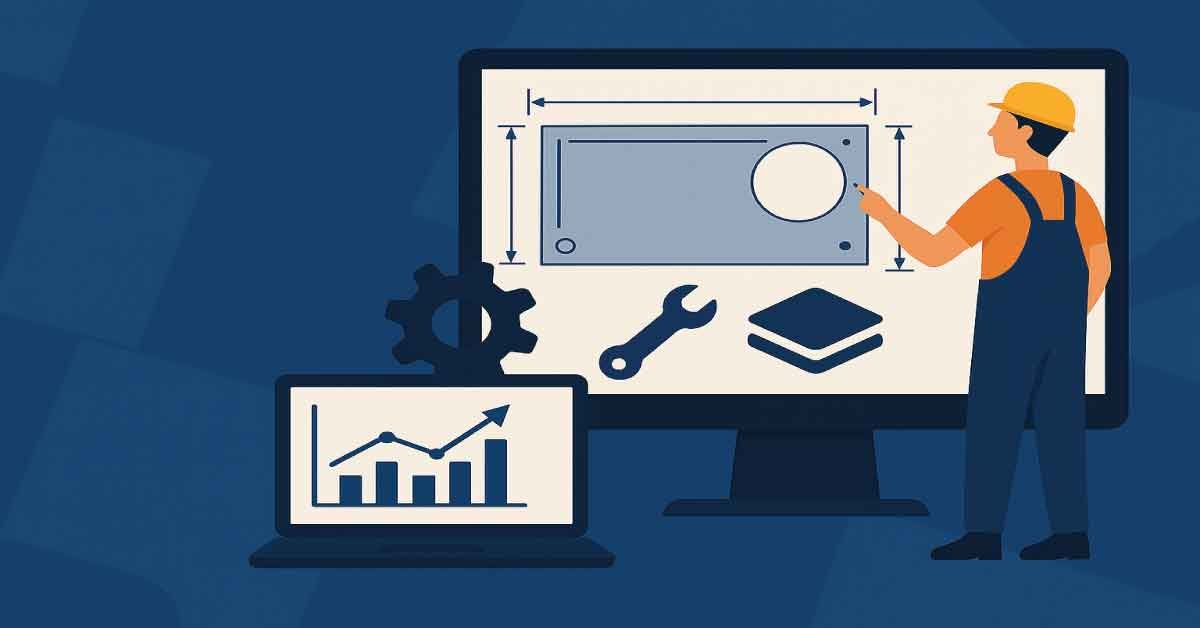Wondering exactly What is Metal Fabrication Software? You are in the right place to get all the insights.
Metal fabrication software refers to a specialized set of tools designed to facilitate and streamline the processes involved in metalworking and fabrication. This software is utilized by businesses in the metal fabrication industry, including fabrication shops, manufacturing facilities, and construction companies, to enhance efficiency, reduce errors, and optimize production workflows. In this article, we will delve into the definition of metal fabrication software, its key features, types, and benefits, as well as how it can transform operations in the metalworking industry.
Definition of Metal Fabrication Software
Metal fabrication software encompasses a range of applications that assist in the design, planning, and execution of metal fabrication projects. These tools help users manage various aspects of the fabrication process, from initial design and quoting to production management and quality control. The primary goal of this software is to enhance productivity, improve accuracy, and streamline operations in the fabrication environment.
Key Features of Metal Fabrication Software
1- CAD (Computer-Aided Design) Integration:
Most metal fabrication software includes CAD capabilities, allowing users to create detailed 2D and 3D designs of metal parts and assemblies. This feature facilitates accurate modeling, enabling users to visualize and refine their projects before production begins.
2- Nest Optimization:
Nesting software optimizes the arrangement of metal pieces on sheets to minimize waste during cutting. By maximizing material usage, businesses can significantly reduce costs and environmental impact.
3- Cost Estimation and Quoting:
Fabrication software typically includes tools for estimating costs based on material, labor, and overhead expenses. This feature allows companies to generate accurate quotes quickly, improving customer satisfaction and closing rates.
4- Production Scheduling:
Metal fabrication software enables effective scheduling of production tasks, helping managers allocate resources efficiently and meet deadlines. This includes tracking work orders, labor hours, and machine availability.
5- Inventory Management:
Maintaining an accurate inventory of raw materials and finished products is crucial in the metal fabrication industry. Software solutions often provide tools for tracking inventory levels, ordering materials, and managing supplier relationships.
6- Reporting and Analytics:
Advanced metal fabrication software includes reporting capabilities that provide insights into production performance, labor efficiency, and material usage. These analytics help managers identify trends, pinpoint inefficiencies, and make data-driven decisions.
7- Collaboration Tools:
Many software solutions offer collaborative features that allow teams to share designs, documents, and updates in real time. This enhances communication and coordination among different departments involved in the fabrication process.
Types of Metal Fabrication Software
1- Standalone Software:
These are individual applications that focus on specific tasks such as CAD, nesting, or estimating. They can be used independently but may lack the integration and comprehensive features of larger systems.
2- Integrated Solutions:
Integrated metal fabrication software combines multiple functionalities into a single platform, offering a holistic approach to managing the entire fabrication process. This type of software is often preferred by larger operations seeking efficiency and ease of use.
3- Cloud-Based Solutions:
Many modern metal fabrication software options are cloud-based, allowing users to access the system from any location with an internet connection. This flexibility can enhance collaboration and remote work capabilities.
4- Industry-Specific Software:
Some software solutions are tailored to specific segments of the metal fabrication industry, such as structural steel fabrication, sheet metal fabrication, or pipe and tubing fabrication. These specialized tools address unique requirements and challenges faced by different sectors.
Benefits of Metal Fabrication Software
1- Increased Efficiency:
By automating repetitive tasks and providing real-time data, metal fabrication software helps streamline operations, reducing lead times and improving overall productivity.
2- Improved Accuracy:
With advanced CAD capabilities and accurate cost estimation tools, the likelihood of errors in designs and quotes is significantly reduced, leading to higher-quality end products.
3- Enhanced Collaboration:
Metal fabrication software fosters better communication among teams by allowing easy sharing of designs, specifications, and project updates, reducing misunderstandings and delays.
4- Cost Savings:
By optimizing material usage, improving production scheduling, and reducing waste, metal fabrication software can lead to significant cost savings in both labor and material expenses.
5- Better Decision-Making:
Access to detailed analytics and reporting tools provides valuable insights into operations, allowing management to make informed decisions that drive continuous improvement.
6- Scalability:
As a business grows, metal fabrication software can scale with it, accommodating increased production volumes, additional users, and new projects without sacrificing efficiency.
Conclusion on What is Metal Fabrication Software:
In an increasingly competitive metal fabrication industry, leveraging advanced software solutions is essential for businesses aiming to enhance their operations and stay ahead of the curve. Metal fabrication software provides the tools needed to optimize production processes, improve accuracy, and reduce costs, ultimately leading to increased profitability and customer satisfaction. By understanding the key features and benefits of this software, companies can make informed decisions when selecting a solution that aligns with their specific needs and goals. Whether a small fabrication shop or a large manufacturing facility, investing in the right metal fabrication software can significantly impact overall performance and success in the market.

